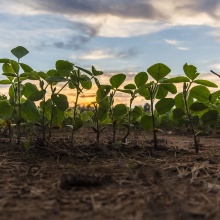Resources are limited. World population is growing. Climate change has arrived in politics. Bioeconomy is a form of economy that relies on sustainable bio-based value chains that replace the use of fossil raw materials. At the same time, economic growth is achieved when ecological, social, and economic factors are considered as a whole.
“Bioeconomy is a type of economy that, within the framework of a sustainable economic system, provides products, processes, and services in all economic sectors by means of knowledge-based production and use of biological resources, processes, and principles.”
Baden-Wuerttemberg Strategy for a Sustainable Bioeconomy, 2019
Using bioeconomy to become sustainable
In 2019, the state of Baden-Wuerttemberg decided on the strategy “Sustainable Bioeconomy” to shape the economic change toward sustainability. Prof. Ralf Takors already paved the way for the project when the preliminary study was conducted. Since November 2020, he has been a member of the advisory board on sustainable bioeconomy, which was subsequently established by the state government.
“It’s no coincidence that Baden-Wuerttemberg in particular impresses with a sustainability strategy that receives Europe-wide acclaim, even from Christian Patermann,” the head of the Institute for Biochemical Engineering at the University of Stuttgart believes. By way of explanation, he refers to the state government, which is led by The Greens: “Baden-Wuerttemberg has a strong interest in actively addressing climate change.” Christian Patermann was the EU’s Director for Ecology and Sustainability in Brussels. Patermann is also a founding member of the Bioökonomierat (Bioeconomy Advisory Committee), which has existed at the federal level since 2009.
The Paris Agreement sets a 1.5 degree target for European policy: Global warming is not supposed to increase by more than one and a half degrees by 2100, compared with pre-industrial levels. Net zero was declared the emissions target. In fact, global greenhouse gas emissions have continued to increase over the past five years.
In Germany, the CO2 tax has been in force since January 2021. It is part of the German government’s Climate Protection Program 2030. Taxation of heating and fuel is a political means of achieving climate targets. What consumers notice on their fuel bills triggers a willingness to rethink on the part of companies. Companies that emit a lot of CO2 and have to pay EUR 25 per ton - and the trend is rising - are concerned with ecology for economic reasons alone.
In 2019, the “Sustainable Bioeconomy” strategy of the state was developed, in close cooperation with scientists, by the Ministry for Rural Areas and Consumer Protection as well as the Ministry for the Environment, Climate and Energy Management, and decided on by the state government. The strategy aims to use renewable or recycled raw materials. This is intended to protect natural resources on the one hand, and strengthen Baden-Wuerttemberg as a business location on the other.
Economic efficiency as a core element
“The goal is a circular economy with zero emissions,” says Takors. He explains that, for a long time, the focus was on fossil raw materials, and the disadvantages of this were hardly felt by the companies. According to Takors, the scientific foundations from biotechnology and bioengineering would have made bioeconomy possible much earlier. “However, it was only when the scarcity of resources and the consequences of climate change came into focus that bioeconomy gained political momentum,” Takors explains.
With the CO2 tax, at the latest, previously unseen consequences of one’s own industrial activities will also become economically noticeable. Takors emphasizes: “But it’s not about punishing the companies - on the contrary, they are accompanied in the change processes and gain from them. Companies that consistently think bioeconomically can save a lot of money.”
Returning to domestic production
One example is sugar, which is a raw material. Sugar can be grown in Germany. At the same time, sugar can be used in microbiological processes to obtain natural flavoring agents from plant-based raw materials. As a result, it is not necessary to fly exotic flavoring agents into the German market, as they can be produced domestically. This strengthens the company’s own business location and at the same time creates attractive jobs, especially in rural areas.
“Theoretically, you wouldn’t even have to grow the sugar,” Takors explains. According to him, sugar could even be extracted from the remains of crops that are normally left on the fields - although this would, of course, be very costly and have other consequences for the environment. But actual waste products, too, such as your normal household waste, can be reintroduced into the cycle of reusable materials by means of gasification and the addition of hydrogen.
Companies are joining in
The activity in government consulting led to giving advice and support to specific companies in Germany. “We looked at who the big emitters are, that is, who emits a lot of greenhouse gas. We then approached specifically these companies and offered our advice,” says Takors.
Didn’t they feel found out? – On the contrary. “The companies react very positively to our consulting offer,” says Takors. “They know that they need to take action in order to be able to remain on the market. Even those who haven’t had anything to do with bioeconomy yet, are working with us in a very constructive way.”
Companies in Baden-Wuerttemberg can be quickly convinced that bioeconomy is equally about nature and environmental protection, and that this is precisely the path to a successful future.






